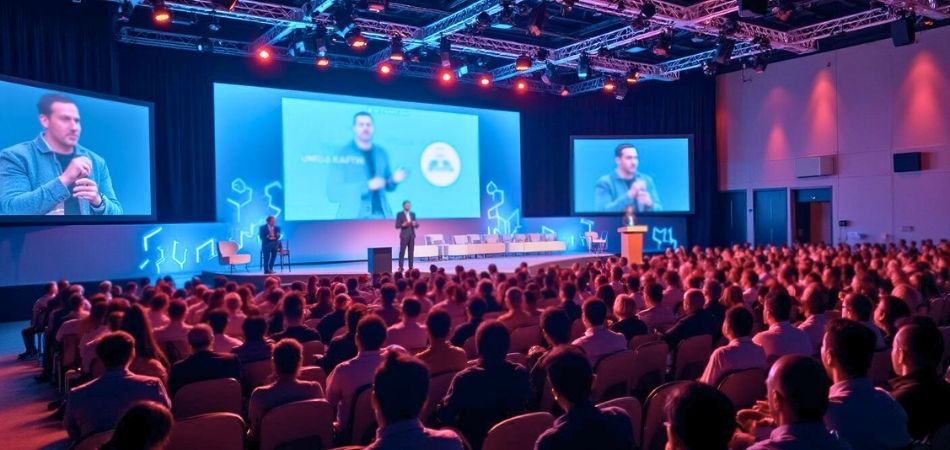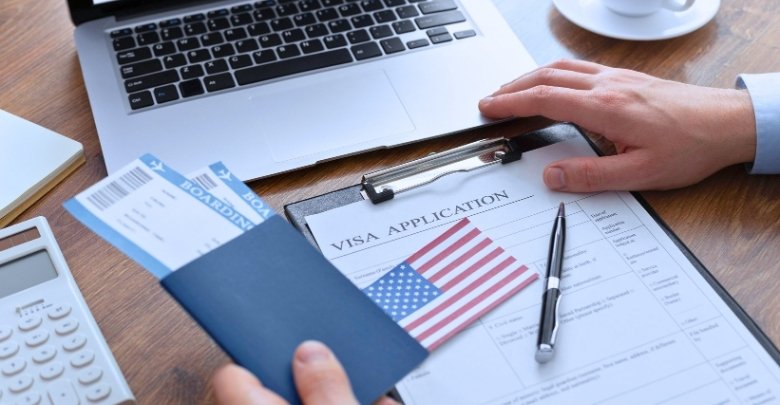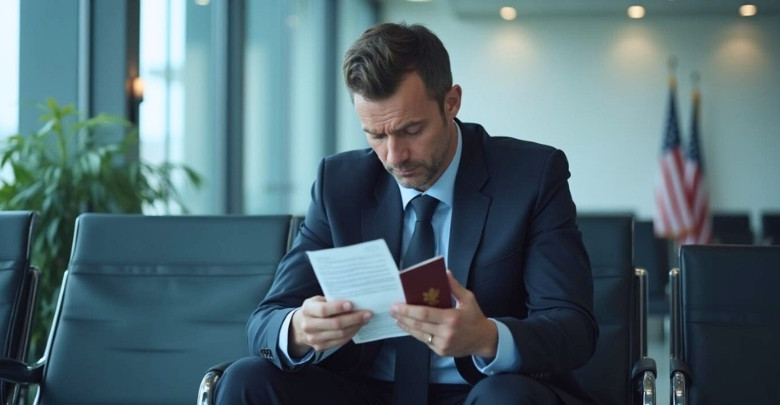Professional conferences are a great way to enhance your network, learn new skills, and grow as a professional in the United States. But before booking your trip, you may be asking yourself, “Do I need a business visa to attend a conference in USA?”
Yes, you need a B-1 business visa to attend a conference in the USA. This visa is required for foreign nationals visiting temporarily for business-related activities, including conferences, meetings, and professional events. Ensure you apply in advance.
The following article will guide you through the application process, eligibility criteria, and key requirements for B-1 visas. Check out this article to learn everything you need to know before attending your next event.
Do I Need a Business Visa to Attend a Conference in USA?
Yes, If you are planning to attend a conference in the USA, a B-1 business visa is typically required. This visa permits foreign nationals to enter the country temporarily for business activities such as attending professional conferences, meetings, and events. It’s important to apply well in advance to allow ample processing time.

Step 1: Know the Purpose of a Business Visa
A B-1 business visa is issued to individuals traveling for professional reasons like conferences, meetings, or negotiations. Unlike tourist visas, it does not allow employment or paid work in the U.S. This visa ensures that foreign professionals can engage in business-related activities legally. Applying in advance helps avoid last-minute delays or complications.
Step 2: Check Your Eligibility for the B-1 Visa
Before applying, confirm that you meet the eligibility requirements for the B-1 visa. You must prove that your visit is temporary and strictly for business. Having a letter of invitation from the conference organizers can strengthen your application. Ensure you have a valid passport and strong ties to your home country.
Step 3: Complete the DS-160 Form
The DS-160 form is an online application required for all U.S. visa applicants. It collects personal, travel, and security-related information. You must upload a recent photograph and provide details about your trip. Carefully review all responses before submission to prevent errors or delays.
Step 4: Pay the Visa Fee
The B-1 visa application fee must be paid before scheduling an interview. The fee varies by country but is generally non-refundable. Payment can usually be made online or at designated banks. Keep the receipt as you will need it for further processing.
Step 5: Schedule Your Visa Interview
Once the fee is paid, you need to schedule a visa interview at your nearest U.S. embassy or consulate. Appointment availability may vary, so book early to secure a suitable date. Bring your DS-160 confirmation, passport, and supporting documents. Arriving well-prepared increases your chances of approval.
Step 6: Attend Your Visa Interview
During the interview, a consular officer will assess your application. Be honest about the purpose of your visit, such as attending a business conference in USA for expanding your business knowledge and network. Answer all questions clearly and provide supporting documents. Once approved, your visa will be issued for your travel.
Why Does Your Visa Type Matter for Attending a Conference?
Choosing the right visa for attending a conference is essential for ensuring smooth travel. The visa determines the purpose of your visit. Without the proper one, you might face delays or denials at immigration.
For business-related events like conferences, a B-1 business visa is typically required. This visa lets you participate in meetings, workshops, and other professional gatherings. Without the B-1 visa, you risk being denied entry to your event.
Business conferences often have strict rules for foreign visitors. The correct visa shows you are attending for a legitimate professional reason. For example, attending business conferences in the USA in 2025 requires you to prove your participation is for business purposes.
The visa process ensures your visit stays focused on your professional goals. It also protects the integrity of your trip. Following the rules makes your experience smoother and more enjoyable.
Differences Between B1 and B2 Visas for Business Travelers
When traveling to the U.S. for a specific purpose, such as business or leisure, choosing the right visa is crucial. The B1 and B2 visas are designed for different types of visits. Below is a comparison to help you understand their distinctions.
| Aspect | B1 Visa (Business) | B2 Visa (Tourist) |
| Purpose | For business-related visits like meetings, conferences, or negotiations. | For tourism, leisure, or visiting family and friends. |
| Eligibility | Issued to those traveling for professional or commercial purposes. | Issued to those traveling for personal, recreational, or medical purposes. |
| Allowed Activities | Attending business meetings, conferences, or signing contracts. | Sightseeing, visiting relatives, or seeking medical treatment. |
| Work Permission | No permission to work or receive payment from a U.S. source. | No work permission or business-related activities are allowed. |
| Duration of Stay | Typically up to 6 months, based on the nature of the business trip. | Generally granted for up to 6 months for leisure or personal visits. |
| Extension Possibility | Can be extended with proper justification and documentation. | Extensions are possible with strong reasons and proof of financial support. |
| Required Documents | Invitation letter, proof of business purpose, and financial support. | Travel itinerary, proof of funds, and intent to return. |
| Interview Requirement | Interview required for most applicants at a U.S. embassy or consulate. | Interview required for most applicants at a U.S. embassy or consulate. |
| Visa Fee | Around $185, but may vary by country. | Typically around $185, with possible variations depending on location. |
| Restrictions | Cannot engage in employment, study, or long-term stays. | Cannot engage in business, employment, or study for credit. |
Can a Business Visa Be Extended After Attending a Conference?
Yes, a B-1 business visa can be extended under specific conditions. The extension request must be filed before the current visa expires. A strong reason, like additional meetings or events, is required for approval. The extension process involves submitting documents to U.S. Citizenship and Immigration Services (USCIS).
Applicants must show valid reasons for staying longer in the country. Providing financial proof and evidence of ongoing business activities is necessary. Without proper justification, the request may face rejection. Filing early reduces the risk of visa expiration issues.
The extension process includes filling out Form I-539 and paying a fee. Applicants must remain in the U.S. while awaiting a decision. The review process can take several weeks to months. Delays may occur due to high application volumes.
Attendees should also consider costs related to their visa extension. Expenses include additional processing fees and personal stay costs. The business conference visa fee in the USA does not cover extensions. Understanding financial responsibilities helps in planning a smooth stay.
Business Visa Denied: What Steps Should Be Taken in This Situation?
When your business visa application is denied, it can be stressful and frustrating. Being aware of the reasons behind it helps you plan your next steps. Below are key actions to take after a visa rejection:
Recognize the Reason for Denial
The U.S. embassy provides a reason for the visa rejection. Common reasons include missing documents, financial instability, or unclear travel intentions. Reviewing the denial letter helps in identifying the issue. Understanding the reason allows better preparation for the next application.
Review Your Application for Mistakes
Errors in the visa application can lead to automatic denial. Incorrect information, missing documents, or unclear details may cause rejection. Carefully reviewing your application ensures accuracy and completeness. A corrected application improves your chances of approval in the future.
Gather Stronger Supporting Documents
Insufficient supporting documents often lead to visa denials. Providing financial proof, a detailed itinerary, and an invitation letter strengthens your case. Documents must clearly show your intent to return home. Submitting well-organized paperwork increases the likelihood of approval.
Seek Guidance from an Immigration Expert
An immigration lawyer or visa consultant can offer professional advice. Experts help in understanding visa policies and improving applications. They assist in gathering the necessary documents for a stronger case. Seeking expert guidance prevents common mistakes in visa applications.
Wait Before Reapplying for the Visa
Reapplying immediately after a rejection may not be beneficial. Addressing the reasons for denial before reapplying increases approval chances. Some cases require a waiting period before reapplying. Patience and preparation improve the likelihood of success.
Prepare for the Visa Interview Again
If required, visa applicants must attend another interview. Practicing clear and honest responses improves confidence. Answering questions directly and confidently creates a positive impression. A well-prepared interview increases the chance of visa approval.
Explore Alternative Visa Options
If a business visa is denied, alternative visas may be available. Some travelers qualify for other visa categories based on purpose. Researching different options helps in finding a suitable alternative. Exploring all possibilities ensures a better chance of entering the U.S.
Frequently Asked Questions
Here are some common questions regarding business visas for attending conferences in the USA. These FAQs provide further clarification on the process, requirements, and important details you should know before traveling.
Can I Attend a Trade Show With a B1 Visa?
Yes, the B1 visa allows you to attend trade shows and other business-related events. You must prove that your attendance is for business purposes, such as networking or learning about industry trends. The B1 visa covers such events when the intent is non-commercial.
How Do I Prove My Intent to Return to My Home Country for a B1 Visa?
You can prove your intent to return by showing strong ties to your home country, such as family, a job, or property. Financial documents and a return ticket can also support your application. The key is to demonstrate that you will not overstay your visa.
Can I Apply for a B1 Visa if I Have Been Denied a U.S. Visa in the Past?
Yes, you can apply for a B1 visa even if you have been denied before. However, it’s important to understand the reasons behind the previous denial and address them in your new application. Providing stronger documentation and clarifying any issues can improve your chances.
Can My B1 Visa Be Denied if I Have Insufficient Funds?
Yes, insufficient funds can lead to a visa denial as it may raise concerns about your ability to support yourself during your trip. It’s important to show proof of sufficient financial resources, including bank statements or a letter from your employer confirming financial backing for the trip.
Is Travel Insurance Required for a B1 Visa Application?
Travel insurance is not a mandatory requirement for a B1 visa application. However, it’s a good idea to purchase travel insurance that covers medical expenses and emergencies during your stay. Some U.S. consulates may ask for proof of travel insurance during your visa interview.
How Long Does the B1 Visa Application Process Take?
The B1 visa application process can take several weeks, depending on the country and consulate processing times. After submitting your DS-160 form and attending your visa interview, approval may take a few days to several weeks. Be sure to apply well in advance of your planned conference dates.
Bottom Line
Taking part in a professional conference in the USA is an excellent way to network and grow professionally. If you are wondering, “Do I Need a Business Visa to Attend a Conference in USA?”, the answer is yes. You must apply for a B-1 business visa, which is designed for temporary business visits, including conferences and meetings.
The visa application process involves several steps, such as completing the DS-160 form, paying the visa fee, and attending an interview. It’s essential to follow all guidelines and provide the necessary documents to increase your chances of approval. Planning ahead and ensuring you meet all requirements will ensure a smooth experience when attending your next conference.







